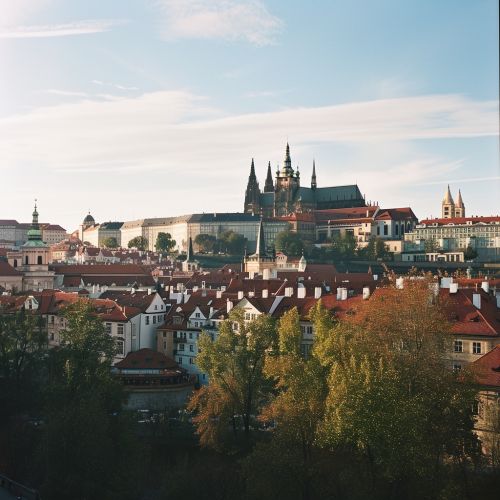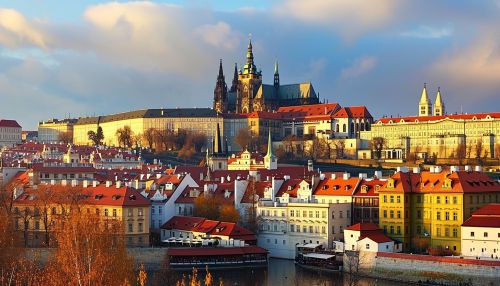Czechoslovakia
History
Czechoslovakia, officially known as the Czechoslovak Republic, was a sovereign state in Central Europe that existed from October 1918, when it declared its independence from the Austro-Hungarian Empire, until its peaceful dissolution into the Czech Republic and Slovakia on 1 January 1993.
Formation
The formation of Czechoslovakia was the culmination of the long struggle of the Czechs against their Austrian rulers. It was largely achieved by the nation's first and second presidents, Tomáš Garrigue Masaryk and Edvard Beneš, who worked together with the Allies during World War I. The Treaty of Saint-Germain-en-Laye recognized the independence of Czechoslovakia and the sovereignty of Masaryk's government.


Interwar Period
The interwar period saw the flourishing of democracy in Czechoslovakia. Despite the country's diverse ethnic composition, the Czechs and Slovaks shared power and the government maintained the principle of Czechoslovakism – the belief in a single Czechoslovak nation – to maintain unity of the state.
World War II
During World War II, Czechoslovakia was occupied by Nazi Germany. The Munich Agreement of 1938, in which the Allies conceded the Sudetenland to Germany, marked the end of Czechoslovakia's status as an independent nation. The country was officially annexed by Germany in March 1939.
Post-War Era
After the war, Czechoslovakia was reestablished as an independent country. The Beneš decrees were issued, expelling nearly 3 million ethnic Germans and Hungarians from the country. The Communist Party of Czechoslovakia, backed by the Soviet Union, then took control of the country, marking the beginning of four decades of communist rule.
Dissolution
The peaceful dissolution of Czechoslovakia, often referred to as the 'Velvet Divorce', took place on 1 January 1993. The country split into two independent states, the Czech Republic and Slovakia. The dissolution was carried out by the Federal Assembly of Czechoslovakia, which decided to dissolve the country, despite the fact that there was no public demand for it.
Politics
The political system of Czechoslovakia was a parliamentary republic, with the President as the head of state and the Prime Minister as the head of government. The country had a multi-party system, with power often exercised by a coalition of parties.
Communist Era
The Communist Era in Czechoslovakia, from 1948 to 1989, was marked by the dominance of the Communist Party of Czechoslovakia (KSČ). The KSČ implemented a Soviet-style planned economy and suppressed political dissent, leading to a period of stagnation known as 'Normalization'.
Velvet Revolution
The Velvet Revolution in 1989 was a non-violent transition of power in Czechoslovakia, marking the end of 41 years of communist rule. It was led by a diverse group of dissidents including the playwright Václav Havel, who later became the last President of Czechoslovakia and the first President of the Czech Republic.
Economy
Czechoslovakia had a mixed economy with a high level of industrialization. The country was rich in mineral resources, including coal, lignite, iron, copper, lead, zinc, mercury, uranium, and tin. The manufacturing sector was dominated by heavy industry, including machinery and equipment, metallurgy, chemical production, and electronics.
Post-Communist Economic Transition
After the fall of communism, Czechoslovakia transitioned to a market economy. The process was characterized by mass privatization of state-owned enterprises and economic restructuring. The transition, however, was not without problems, including high unemployment, corruption, and economic inequality.
Culture
Czechoslovak culture was characterized by a strong sense of national identity, despite the country's ethnic diversity. The country was known for its contributions to literature, music, film, and the visual arts.
Literature
Czechoslovak literature is rich and diverse, with many Czech and Slovak authors achieving international recognition. The country has a strong tradition of dissident literature, with authors such as Milan Kundera and Václav Havel writing influential works during the communist era.
Music
Czechoslovakia has a rich musical heritage, with notable contributions to both classical and popular music. The country is known for its folk music, as well as for its classical composers such as Antonín Dvořák and Bedřich Smetana.
